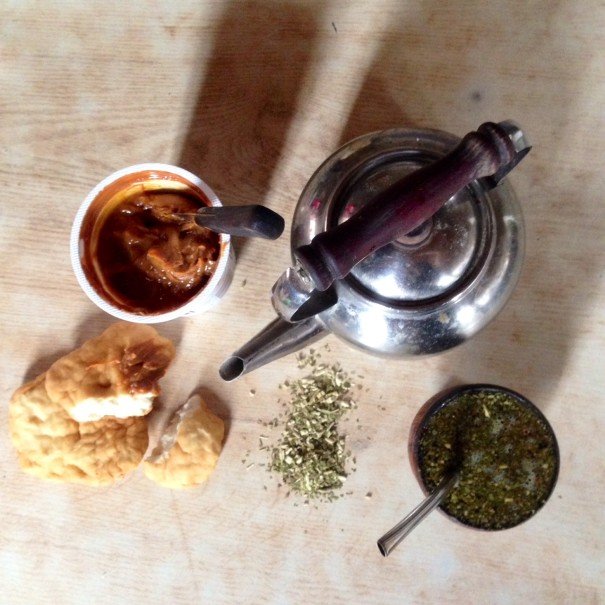
Who Needs Coffee?

Who Needs Coffee?
Mate in Patagonia
The sun rises late in Patagonian autumn. Come April and May, the golden streaks of dawn lighten the sky close to 9 am. I awake at 7 am on the morning of the cattle drive, in Jaime’s puesto, a cluster of shacks where he lives and works. We are in Laguna Negra, a remote grazing post that took us an entire day to reach on horseback. We rode past arid, yellow grasslands, black valleys, up and down the sliding scree of mountains, to reach this oasis of lush greenery, gray under low-hanging clouds. Today, we aim to push his cattle from their summer pasture to a warmer, winter one.
I am discombobulated by the unceasing dark and the waning haze of wine that perked up our asado the night before. As I stumble into the next wooden shack, Jaime sits around a crackling fire in full gaucho gear: a button-down shirt under a vest, a silk scarf that in any other circumstance would scream RAKISH, a red belt-sash holding up loose bombachas, sturdy riding boots, and a boina (a hat resembling a French beret).
He sips from a metal straw, embedded in a brown gourd filled with tea leaves. Quieres mate?
Sí. I accept the godsend of concentrated energy. Jaime lifts the kettle of water from atop its bed of ashes and refills the mate, which in a previous life was the fruit of the yerba mate tree. As I take my sip, the tea rises up the silver straw, called a bombilla, and hits me with the punch of a mule kick, tasting as it always does of grass and earth, with a deep, bitter tang.
As the proclaimed national drink of Argentina, mate is drunk by all and sundry, young and old. But with its gauchos—Argentinian cowboys—who work long, thankless, and sometimes cruelly solitary days out in deep country, the drink attains life-giving status. Never have I seen a gaucho taint his lips with mere water. Mate is chock full of good things: antioxidants, vitamins C, B1, and B2. It lowers cholesterol. It wakes you up. It suppresses the appetite. Even the early colonialists marveled at how, even with a one-dimensional diet of meat and mate, the gaucho never seemed to contract scurvy. It is, essentially, all he needs to start his day, even if that day involves chasing a hundred cows up and down a mountain on a braying mule in a wind that fills your orifices with dust and threatens to blow the saddle off your ride’s back.
The modern gaucho makes concessions, sometimes supplementing his morning meal with a torta frita (fried bread) and a slather of dulce de leche. But viewing mate as mere alimentation would be to miss its point. It is also a comforting, long-held ritual, woven into the very fabric of the gauchos’ work and social lives.
Alone for the summer, the ritual of making mate ad infinitum fills the hours of profound solitude. Observe a group of gauchos together, however, and the constant ribbing, joking, laughing, and general horseplay makes apparent their love for social interaction. And mate. Invariably, a cebador, or server, takes charge of proceedings. He fills the mate each time, ensuring the temperature of the water and the strength of the drink is perfect. The gourd is passed clockwise around the group. Each receiver drinks the mate dry during his turn, then passes it back to the cebador. When a receiver has had enough, he adds a gracias while handing the mate back. This can go on for hours.
Other rules cling to the ritual. Touching the bombilla is a no-no. Spitting out the first sip is a yes; some maintain it’s for luck, others for the more practical reason of ‘washing out’ the first bitter brew. You never wash your mate, the gourd in which the drink is served. Rinsing out the bombilla is fine, but not necessary. Some like it with sugar, but others disdain that as a kid’s drink. And what are a ritual’s rules but the links that bind its partakers in a sense of camaraderie? The sense that ‘I know what I’m doing in the mate-drinking world, and now I belong.’
Come 9 am, the sun is barely out. The mist-shrouded hills promise a difficult day, a fact our patiently grazing horses are blissfully unaware of. It is time to leave. As I step back into Jaime’s shack after saddling my ride, he hands me the mate one more time. For the road.
Again, the invariable mule-kick of energy, this time followed by the unmistakeable punch of … whiskey, Jaime says with a grin. I spot the half-empty bottle of The Breeder’s Choice by his feet.
Sometimes, a gaucho needs just a little more to start his day right.